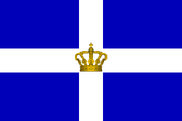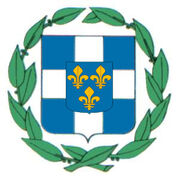| Βασίλειον τῆς Ἑλλάδος Kingdom of Greece | |
| 1770 – | |

|

|
| Motto Freedom or Death. | |
| Capital | Athens |
| Largest City | Athens |
| Official language | Greek |
| Government Type - Monarch -Prime Minister |
-Constitutional and Parliamentary Monarchy -King Constantine II of Greece -Kostantinos Karamanlis |
| Establishment - Independence fomr -Independence |
Ottoman Empire 1770 |
| Area | 189 544 km² |
| Population | 37,572,323 |
| HDI | 0.942 |
| HDI Rank | 25th (very high) |
| Currency | Euro € |
| Demonym | Greek |
| Religions | Eastern Orthodox Church (de jure and largest religion), Islam, Judaism |
History[]
Divergence from Our World[]
Greece diverges from OTL Greece in the year 1770. In our world the Orlov Revolt took place, where Russia was looking to dismantle the Ottoman Empire and gain a warm-water seashore. Here, when the Russians sent diplomats to rile up the Peloponnesians, in the world of Aztec Empire, the Russians decided to strike a deal with the British and French, both felt sympathies to Christian Greece under Muslim Turkish rule. The deal was that if Russia were to gain the Black Sea regions of the Ottoman Empire as well as protectorates over the Balkan states, Britain and France would have North Africa and the Middle East.
Orlov Revolt[]
In our world the Russians reached Greece in February of 1770, with British and French warships with them. The British and Russians would take the Ottomans by sea, the French, Greeks, and 50 Russian soldiers take the Turks by land. With so much more help than in OTL, the combined European forces crush the Turks. A Kingdom of Greece is established from the Peloponnesos, Attiki, Aegean Islands, Crete, and Thessaly (in OTL Thessaly & Crete were not originally part of Greece right away). The Crimean Khanate, Circassia, and Meskheti were ceded to Russia. Moldova gained a seashore and the Principalities Wallachia, Moldova, Transylvania, and Serbia became Russian vassal states (they were formally vassals to the Ottomans). Britain gained an ungodly amount of land. In order to gain easier access to India, Britain took Egypt, Mesopotamia, and Hijaaz. France took Barbary and Libya. Tunisia was surprisingly taken by the Russians, feeling left out of the best of the land deals. Anything east of British Mesopotamia and and south of Russian Circassia was given to Persia, to whom the British decided to make nice with in order for easier access to India and possibly making sure there would be no Safavid invasion of Northern India. Finally the British took the Dodecanese Islands (much to the rejoice of the Knights Hospitallers), Ottoman East Africa and Yemen were so now so far separated from Constantinople, they gained their independence, reverting back to a patchwork of tribes. The Ottomans barely were left with the Northern Balkans and Anatolia, to which they held onto fiercely. For his bravely and ferocity, Petro Mavromichalis was crowned the First King of Greece by Archbishop Bartholomew of Athens. Surprisingly, it was the Aztecs who recognized the new nation second; after the joint Protocol that the British, French, & Russians acknowledged the Kingdom of Greece.
Hellenic Republic[]
Much like Italy and Iberia, when Napoleon was conquering Europe, he came knocking on the door of the Greeks. Originally, the Greeks allied themselves with the French, hoping that they would pass on to Russia. Napoleon used Greece as a wintering grounds for battles against the nearby Austrians. Eventually a puppet state was created by Napoleon, the First Hellenic Republic. He eventually allowed the people of Krētē to establish their own "Republic of Krētē". Finally, the extortion of the Greeks came with Napoleon directly annexing the islands of Kerkyra, Paxi, Lefkatha, Kefalonia, Itháka, Zakynthos, Kythira. The Mavromachalis Dynasty of Greece fled to Britain, where they purchased an estate within London.
Congress of Vienna[]
At the Congress of Vienna Pedro Gómez Labrador represented Maria Louisa, Duchess of Lucca. In our world he was imcompetent and prone to temper tantrums when he did not get his way, because of this Metternich decided not to restore Parma to the House of Bourbon. However a deal was struck between Metternich and Gómez Labrador. The Duchy of Parma was given to Napoleon's wife, former empress Marie Louise. The Duchy of Lucca was given to Maria Louisa of Spain. Her son, Charles II, Duke of Parma was crowned King of Greece, taking one of the daughters of the Mavromichalis Family as his wife. On top of this, he was to be next in line for being crowned Duke of the Duchies of Lucca and Parma. Once in his Kingdom, he was met with open hatred and disapproval from his new subjects. He was pressured into converting to Orthodoxy, for fear of a revolt. Soon enough, he immersed himself into the Greek culture, becoming quite fluent in Modern Greek, and somewhat proficient in Classical Greek. His Coat of Arms was designed to show his newfound heritage, along with his Spanish Bourbon heritage. The House of Bourbon-Grecia (also called "House of Bourbon-Ellatha") is still the ruling family of Greece today.
